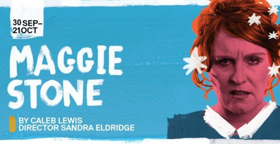Review: Debt, Discrimination And Desperation Come Together in MAGGIE STONE

Friday 5th October 2018, 7:30pm, Eternity Playhouse
Caleb Lewis' Maggie Stone challenges the audience to consider compassion and the complexity of charity as debt is displayed in different forms. Darlinghurst Theatre Company's interpretation of the 80 minute play which premiered in 2013 by the State Theatre Company of South Australia presents a contemporary refugee story that has hopefully progressed in the intervening years but never the less holds an ongoing relevance in the contemplation of giving and receiving.
Maggie Stone (Eliza Logan) is a middle aged senior loans officer at a suburban bank but unlike the usual promotional material of most financial institutions that their staff are there to help make dreams come true through the provision of loans and financial products, Maggie is as hard as her name. Racist and bitter with no friends and only a pet lizard at home, the brash banker who survives on a diet of fast food, cigarettes and booze lives her life beholden to no one so when the Sudanese Prosper Deng (Thuso Lekwape) asks for a small loan to repair his car so he can work and repay his debts, she has no qualms about declining the application despite his hints that the consequences of not repaying his other debts could be extreme. It isn't until Prosper's wife Amath Deng (Branden Christine), with the assistance of her do-gooder friend from church Georgina (Anna Lee), applies for a greater loan that Maggie realizes the destruction that her denial of a Prosper's loan has caused Amath and her son Benny (Lekwape). Between the disastrous results and Georgina's complaint to her managers about her behavior, Maggie is now indebted to Amath and an intriguing 'friendship' is formed.
In addition to seeing Maggie's racist attitudes Lewis also gives glimpses of divides between migrant groups, particularly in the conflict between Middle Eastern shopkeeper Mahira (Kate Bookallil). He also exposes the challenge of understanding underlying motives of charity as Georgina believes she is being generous but is really just trying to order Amath around expecting gratitude and praise for her good Samaritan actions but never really putting anything on the line to help her 'friend'. This is in contrast to the ordered debt of bank loans and loan sharks, represented by the local payday lender Leo (Alan Dukes) who isn't afraid to use less scrupulous methods of ensuring debts are recouped.
Director Sandra Eldridge does well with the somewhat shallow story that sees short sharp scenes play out on Production Designer Sallyanne Facer's set. With a backdrop of a stack of shipping containers indicating an outer Adelaide suburb, possibly near Port Adelaide, Facer defines the different spaces with different doors and exposed patches of different flooring that emerge from the blue sweep of stage. She keeps the set dressing simple with a second-hand sofa and a basic table and chairs that serve as the loans office, various homes, and Mahira's convenience store. Thankfully an illuminated sign helps shift the scenes and delineate the acts as there is little else to indicate some spaces.
Whilst covering some complex ideas and emotions Lewis' story doesn't allow the characters' much depth, instead drawing on stereotypes to cement the ideas. The cast however deal with this deficiency as well as can be expected. Logan and Christine do well at delivering the two central characters, Maggie and Amath with a natural realism whilst the brevity of Lee and Dukes' roles relies on them presenting more of a simplified caricature of a middle aged man and an overly 'helpful' church-goer. Lewis has written Maggie as an unlikeable character who makes statements that has the audience audibly reacting in shock to the "she can't say that" moments and Logan's expression ensures that the distain is more than just verbal whilst also balancing this response with the inner conflict as makes friends with Amath and tries to repay the 'debt'.
Whilst the storyline isn't perfect as it is slow to start and somewhat stilted by the short scenes, the underlying message is important and though provoking. Maggie Stone prompts the audience to consider the balance of 'debt' in their own world and when we do something expecting no reward and when actions are done on the understanding of repayment. It also reminds the audience that the refugee story doesn't end with placing people in the community and that there is still care and compassion required for everyone regardless of background. Originally an Adelaide story that is unfortunately quite national in its underlying essence.
http://www.darlinghursttheatre.com/whats-on/maggie-stone
Comments
Videos

